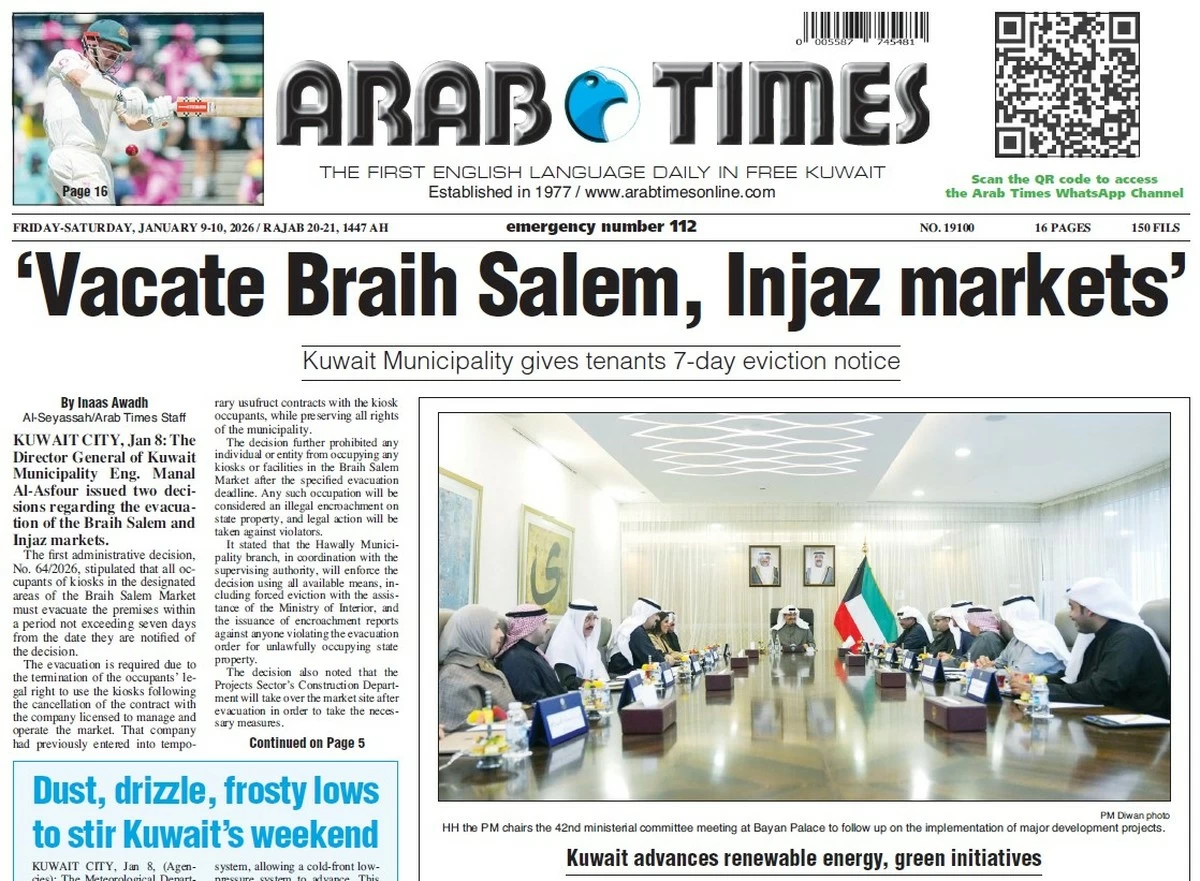06/01/2025
06/01/2025

KUWAIT CITY, Jan 6: The Amiri directives have placed significant emphasis on advancing women’s rights and empowering their capabilities, further solidifying Kuwait’s position as a regional leader in the empowerment of women. This focus has manifested in a series of initiatives and programs that have led to tangible achievements across various sectors of development and nation-building.
Kuwait firmly believes that real progress cannot be achieved without the active participation of women in all aspects of life. This belief is reflected in the country's development plans, government policies, and legislative movements. With women making up more than half of the Kuwaiti population, their contributions to society's progress and their significant presence in diverse fields are increasingly apparent. The state's comprehensive support for women at all levels is clearly demonstrated in the improvement of global indicators for women’s empowerment, with Kuwait rising from 123rd to 61st place globally among 177 countries, according to a report by the Georgetown Institute for Women, Peace, and Security. The country also improved its position by 10 points in the global gender gap index.
Kuwait has successfully localized women's empowerment in its government policies, aligning its efforts with Article 29 of the Constitution, the New Kuwait Vision 2035, and the fifth goal of the United Nations 2030 Sustainable Development Goals, which focuses on achieving gender equality and empowering all women and girls.
Kuwait's development plans have addressed various aspects of women's support, including improving health services, ensuring equal economic opportunities, bolstering social safety nets, and creating employment and financial opportunities to enhance women’s quality of life. These plans also aim to increase women’s participation in society, implement mechanisms to protect them from domestic and societal violence, expand access to services, and improve women’s involvement in economic, political, and social spheres. Additionally, efforts have been made to address the impact of climate change on women’s lives.
Numbers reflect the strong pillar of women’s empowerment in Kuwait Vision 2035. Kuwaiti women now represent over 58% of the national workforce, with 48% employed in the private sector and 60% in the public sector. Women hold 28% of leadership positions across all state sectors, including ministerial and undersecretary roles. In the Ministry of Defense, women occupy 47% of leadership and supervisory positions, while 43% of the military engineering sector is also led by women.
In a historic achievement, last September, Kuwait appointed four women as directors in the Public Prosecution, making it the first such instance in the country’s history. Additionally, there are currently 88 female prosecutors and 19 female judges in Kuwait. In the security sector, 19 women were appointed to the Amiri Guard for the first time, and the number of female police officers has exceeded 900.
The Ministry of Foreign Affairs now boasts 144 female diplomats, constituting 22% of the total diplomatic staff, while women make up 54% of the employees at the Kuwait Petroleum Corporation, which is a cornerstone of the country’s economy. Women also occupy 41% of leadership roles at the Central Bank of Kuwait and 35% of the workforce in Kuwaiti banks.
Kuwait is also a regional pioneer in women’s empowerment, being the first Gulf country to adopt the Women's Empowerment in the Private Sector Initiative in 2010, in collaboration with UN Women and the United Nations Global Compact. Furthermore, Kuwait is a leader in the regional "Waraqati" project, which aims to enhance legal protections for women and ensure their full participation in various fields.
The state has also taken significant steps to support women within productive families. The Ministry of Social Affairs and Labor runs multiple projects aimed at empowering these families, such as the Business Incubator and the Project Development Project, which includes initiatives like "From My Earnings" and "Boutique 33." Government efforts have made it easier for small businesses to thrive by providing soft loans and sales outlets for products through seasonal and permanent exhibitions.
Collaboration between the public and private sectors has successfully transitioned 214 women from receiving social assistance to becoming entrepreneurs, helping to improve their economic independence and income. The private sector in Kuwait also actively supports women’s empowerment through initiatives like the Kuwait Platform Initiative for Women’s Economic Empowerment, which involves over 40 companies.
Kuwait has ratified key international agreements to protect women’s rights, including the Convention on the Elimination of All Forms of Discrimination against Women and the International Convention on the Suppression and Exploitation of Trafficking in Persons, among others. These agreements ensure that the country meets its international obligations toward women’s rights and gender equality.
Kuwait has also made strides in implementing the Beijing Declaration and Platform for Action and has a strong partnership with the Ban Ki-moon Center for Global Citizenship, with an Amiri grant of one million US dollars helping to establish the center. Moreover, Kuwait works closely with the United Nations and regional organizations, particularly ESCWA, to enhance the capabilities of Kuwaiti women and help them play a more active role in achieving national and global development goals.
International recognition of Kuwait’s progress in women's empowerment continues to grow. In December 2023, the National Committee for Women, Peace, and Security was established, and the Kuwait Award for Distinguished Women was created. The Women and Business Committee, established in 2021 by the Supreme Council for Planning and Development, highlights the importance of women’s leadership in achieving the fifth Sustainable Development Goal.
In recognition of women’s political achievements, Kuwait designated May 16 as Kuwaiti Women’s Day in 2015. This date commemorates the granting of political rights to women in 2005, which paved the way for their successful involvement in parliamentary and ministerial roles. Currently, the Kuwaiti government includes three female ministers: Dr. Noura Al-Mashaan, Minister of Public Works; Dr. Amthal Al-Huwaila, Minister of Social Affairs, Family, and Childhood Affairs; and Noura Al-Fassam, Minister of Finance and Minister of State for Economic Affairs and Investment.
The country has also developed a comprehensive legal framework to support and protect women in various sectors. This includes laws such as the Protection from Domestic Violence Law (No. 16 of 2020) and the Public Aid Law (No. 12 of 2011). Other significant legislation includes the Labor Law, the Law on Education Rights, and the Law on Combating Information Technology Crimes, which provides protection against electronic blackmail.
Kuwait’s commitment to women’s rights is further reflected in its establishment of the Supreme Council for Family Affairs, which works with civil society institutions to promote awareness and guidance on family protection. The Council also seeks regional and international cooperation to enhance women’s empowerment.
Kuwait has invested in women-friendly sports infrastructure through the Kuwait Sports Development Strategy 2022-2028, aiming to boost the participation of women in various sports. This effort has already produced inspiring female athletes, such as Suad Al-Faqan and Amina Shah, who competed in the 2024 Paris Olympics. Al-Faqan even won third place in rowing.
The country also operates about 22 community development centers that offer social services and family counseling to help prepare and train women for various professional fields, further enhancing their contributions to society.
Kuwaiti women have achieved notable success on the international and regional stage. Dr. Reem Al-Shammari won the Arab World Cybersecurity Woman Award in 2024, Dr. Asma Al-Kandari was appointed the representative of the American Society of Gastroenterology and Endoscopy in the Middle East, and engineer Lama Al-Ariman was selected as the Vice President of the Middle East and Central Asia Committee of the International Astronautical Federation. These achievements reflect the growing presence and leadership of Kuwaiti women in technology, business, and other sectors.
Kuwait continues to make strides in empowering women, both domestically and internationally, solidifying their role as vital contributors to the country's development and global progress.


